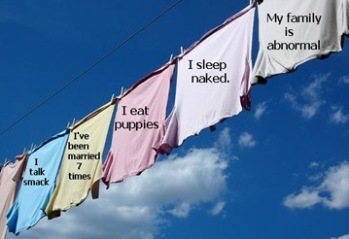영어를 배우시다 보면, 언어표현들도 중요하다는 것을 아실거에요.
하지만, 이런 표현들이 녹아 있는 문화를 심층적으로 이해하는 것이 얼마나 중요한 지를 깨닫고 계시리라 짐작됩니다.
오늘 이 포스트에 올린 것이 바로 그 대표예라고 할 수 있습니다.
advanced level에 있는 분들을 위해 올려 봤어요. 꼭 사전에서 모르는 단어나 표현들은 찾아보시면서,
재미있게 읽기를 바랄께요. ^^
http://www.theroot.com/articles/culture/2014/05/potentially_racist_words_and_phrases.html
When Racism Slips Into Everyday Speech
Using these common words and phrases with questionable histories just might make you sound like an accidental racist.

DOH!
A recent NPR story revealed the disturbing and shockingly racist origins of the catchy jingle played from ice cream trucks around the country. What else are we hearing—or saying—that we should know more about?
These seemingly innocuous terms have questionable origins or histories related to race, and there’s probably plenty more where they came from.
1. “The peanut gallery”: Just a dismissive term for hecklers or critics, right? Wrong. You’ll probably never use this phrase in reference to a group of black people again once you know its history. Itoriginally referred to the balconies of segregated theaters, where African Americans had to sit. (Why “peanut”? Apparently, peanuts were introduced to America during the slave trade and thus became associated with blacks.)
2. “The jig is up”: Although this expression is used today to describe a joke or scheme that has been revealed or foiled, you’re the one whose fun might end quickly if you say it to the wrong person. This hasn’t been proved beyond a doubt, but many believe the saying was used in its original form by some in the American South to refer to the lynching of a black person. Replace “j” with “n” andyou’ll get it.
3. “Call a spade a spade”: For more than 500 years, this expression has meant “to tell it like it is.” But it wasn’t until the Harlem Renaissance of the 1920s that “spade” became a disparaging code word for black people. It’s probably best to retire this phrase forever.
4. “Sold down the river”: Today, if people say they’ve been “sold down the river,” they probably mean they’ve been betrayed. But when the phrase originated, that betrayal was a lot more serious. During slavery, being “sold down the river” was literal. Slave owners would sell their slaves and send them via the Mississippi or Ohio River to plantations in the Deep South, where plantation conditions were much worse.
5. “Eeny, meeny, miny, moe”: Learning the history of this phrase might taint your childhood memories. Heard at playgrounds around the world, this counting-out expression comes from a classic children’s rhyme dating back to the 19th century. Some early versions include the lyric, “Catch a n–ger by the toe.” The n-word was replaced by “tiger” in later years. Not quite as cute now, is it?
6. “Cotton-picking”: “Are you out of your cotton-picking mind?” We’ve all heard the phrase, but the term has an ugly, if debatable, past. Some say it was used to denote the inferior status of poor farmers and field hands in the Southern states, many of whom were slaves. We’ll just say you’d have to be crazy to say this to anyone who might associate it with that history.
7. “Spook”: How can this word be so bad? If you’ve ever celebrated Halloween, you’ve used some version of it. What is now used regularly to mean “ghost” or to frighten is also a slur akin to “n–ger.” It may have its origins in the perception that dark skin blends into the night, making black people ghostlike. Scarily racist.
8. “Grandfather clause”: You may have been lucky enough to be “grandfathered” into your cellphone plan, but this term has an ugly past. During the 1890s, half a dozen Southern states enacted laws to defy the 15th Amendment and prevent black people from exercising their newfound right to vote. In these states, you were allowed to vote only if your parents or grandparents were able to vote before the year 1867—which was conveniently before blacks had access to the ballot. These days we all have equal rights to this phrase, but it’s probably best if we agree to go ahead and drop it.


















